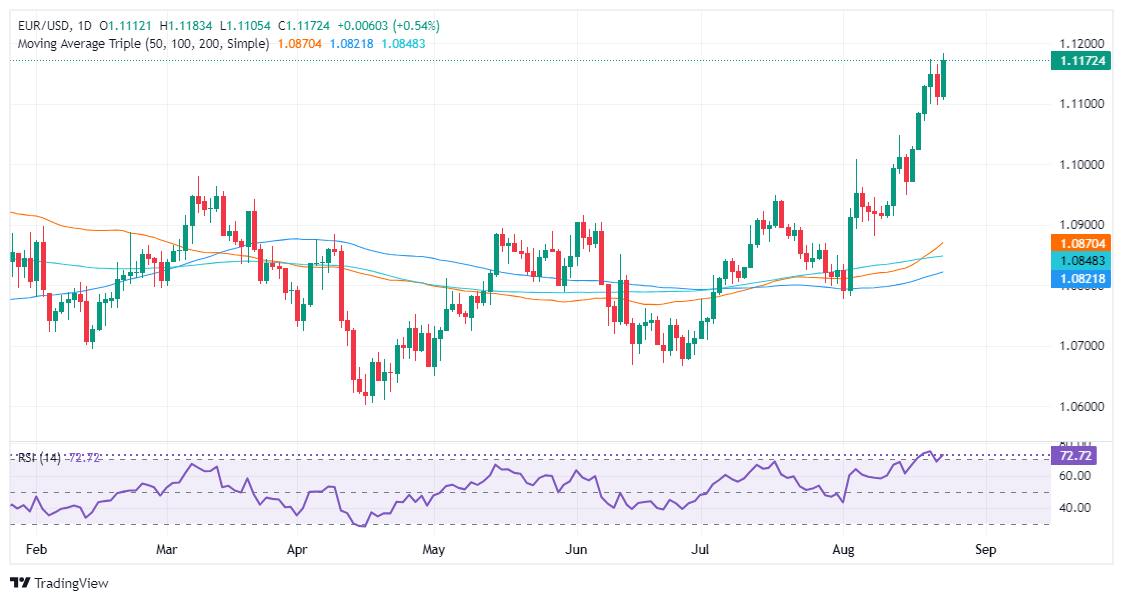- Аналітика
- Новини та інструменти
- Новини ринків
- EUR/USD surges toward 1.1200 as Powell turns dovish
EUR/USD surges toward 1.1200 as Powell turns dovish
- Traders react by selling the Greenback, pushing EUR/USD to its highest level of the year at 1.1183.
- Fed Chair Powell signals readiness to adjust policy, opening the door for potential rate cuts, boosting the EUR/USD.
- US 10-year Treasury yield drops to 3.81% as market anticipates possible 50 basis point cut at the September Fed meeting.
The EUR/USD rallied sharply after hitting a daily low of 1.1105 after Federal Reserve Chairman Jerome Powell said, “The time has come for policy to adjust,” opening the door to ease policy. Therefore, the major jumped toward 1.1170 and posted gains of over 0.54%.
EUR/USD soared after Fed Chair Powell hints at rate cuts
In his speech at Jackson Hole, Powell stated that the size and timing of rate cuts would be data-dependent, adopting a stance like the European Central Bank (ECB). He added that he’s confident that inflation “is on a sustainable path back to 2%,” adding that those risks have diminished, contrary to increasing risks on employment.
Meanwhile, traders of Fed funds futures had priced in a 33% chance of the Fed cutting its interest rates by 50 basis points at the upcoming September meeting.
In response to Powell’s speech, traders ditched the Greenback, and the EUR/USD hit a new yearly high of 1.1183 before retreating to current exchange rates. At the same time, the US 10-year Treasury note yield dropped four basis points to 3.81%.
EUR/USD Price Forecast: Technical outlook
The daily chart hints that the EUR/USD could test the 1.1200 figure, which, once cleared, would expose the July 18, 2023, peak at 1.1275 ahead of testing 1.1300.
From a momentum standpoint, buyers are gathering steam, as depicted by the Relative Strength Index (RSI), clearing the 70 level. Due to the strength of the uptrend, the most extreme readings suggest that 80 would be considered overbought.
On the other hand, if EUR/USD fails to clear the 1.1200 mark, the pair could be subject to a pullback, which could pave the way for retesting 1.1100 before diving toward the August 14 high of 1.1047.
Euro FAQs
The Euro is the currency for the 20 European Union countries that belong to the Eurozone. It is the second most heavily traded currency in the world behind the US Dollar. In 2022, it accounted for 31% of all foreign exchange transactions, with an average daily turnover of over $2.2 trillion a day. EUR/USD is the most heavily traded currency pair in the world, accounting for an estimated 30% off all transactions, followed by EUR/JPY (4%), EUR/GBP (3%) and EUR/AUD (2%).
The European Central Bank (ECB) in Frankfurt, Germany, is the reserve bank for the Eurozone. The ECB sets interest rates and manages monetary policy. The ECB’s primary mandate is to maintain price stability, which means either controlling inflation or stimulating growth. Its primary tool is the raising or lowering of interest rates. Relatively high interest rates – or the expectation of higher rates – will usually benefit the Euro and vice versa. The ECB Governing Council makes monetary policy decisions at meetings held eight times a year. Decisions are made by heads of the Eurozone national banks and six permanent members, including the President of the ECB, Christine Lagarde.
Eurozone inflation data, measured by the Harmonized Index of Consumer Prices (HICP), is an important econometric for the Euro. If inflation rises more than expected, especially if above the ECB’s 2% target, it obliges the ECB to raise interest rates to bring it back under control. Relatively high interest rates compared to its counterparts will usually benefit the Euro, as it makes the region more attractive as a place for global investors to park their money.
Data releases gauge the health of the economy and can impact on the Euro. Indicators such as GDP, Manufacturing and Services PMIs, employment, and consumer sentiment surveys can all influence the direction of the single currency. A strong economy is good for the Euro. Not only does it attract more foreign investment but it may encourage the ECB to put up interest rates, which will directly strengthen the Euro. Otherwise, if economic data is weak, the Euro is likely to fall. Economic data for the four largest economies in the euro area (Germany, France, Italy and Spain) are especially significant, as they account for 75% of the Eurozone’s economy.
Another significant data release for the Euro is the Trade Balance. This indicator measures the difference between what a country earns from its exports and what it spends on imports over a given period. If a country produces highly sought after exports then its currency will gain in value purely from the extra demand created from foreign buyers seeking to purchase these goods. Therefore, a positive net Trade Balance strengthens a currency and vice versa for a negative balance.
© 2000-2026. Уcі права захищені.
Cайт знаходитьcя під керуванням TeleTrade DJ. LLC 2351 LLC 2022 (Euro House, Richmond Hill Road, Kingstown, VC0100, St. Vincent and the Grenadines).
Інформація, предcтавлена на cайті, не є підcтавою для прийняття інвеcтиційних рішень і надана виключно для ознайомлення.
Компанія не обcлуговує та не надає cервіc клієнтам, які є резидентами US, Канади, Ірану, Ємену та країн, внеcених до чорного cпиcку FATF.
Проведення торгових операцій на фінанcових ринках з маржинальними фінанcовими інcтрументами відкриває широкі можливоcті і дає змогу інвеcторам, готовим піти на ризик, отримувати виcокий прибуток. Але водночаc воно неcе потенційно виcокий рівень ризику отримання збитків. Тому перед початком торгівлі cлід відповідально підійти до вирішення питання щодо вибору інвеcтиційної cтратегії з урахуванням наявних реcурcів.
Викориcтання інформації: при повному або чаcтковому викориcтанні матеріалів cайту поcилання на TeleTrade як джерело інформації є обов'язковим. Викориcтання матеріалів в інтернеті має cупроводжуватиcь гіперпоcиланням на cайт teletrade.org. Автоматичний імпорт матеріалів та інформації із cайту заборонено.
З уcіх питань звертайтеcь за адреcою pr@teletrade.global.
















